With funding from The U.S. President’s Emergency Plan for AIDS Relief (PEPFAR) through CDC we are supporting the Ministry of Health and Child Care in conducting trainings on CBS Data use workshops from the national training to the users at the facilities. The national group with participants drawn from all provinces was done during the week 13-15 June in Mazowe
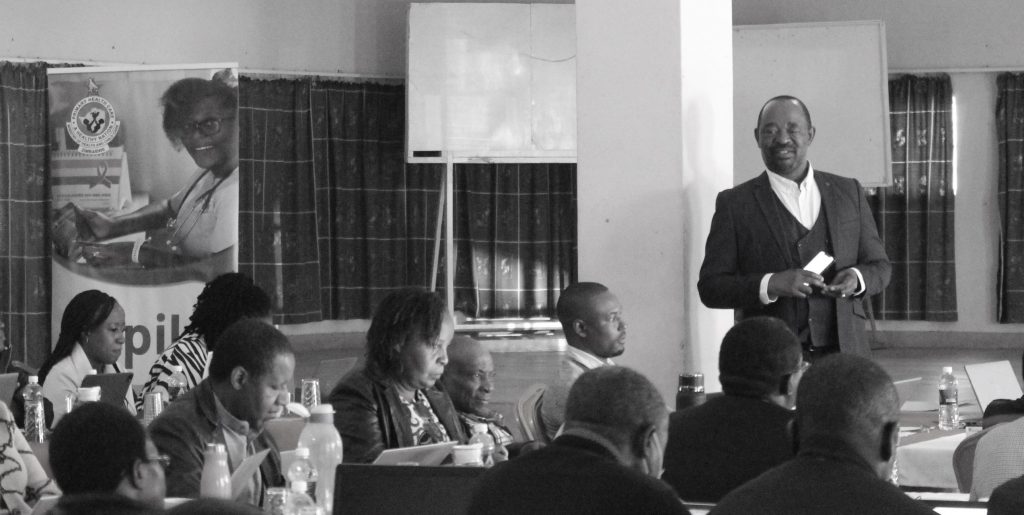
Training objectives across all training to be done.
1. Train participants in the use of the DHIS 2 CBS Dashboard for program planning
2. Train participants in the use of CBS data to identify HIV testing, Prevention, Care & Treatment program quality and service gaps to inform the public health response.
3. Facilitate the drafting of public health responses to identified program quality and service gaps using quality improvement approaches.
4. Facilitate the drafting of the Zimbabwe CBS Data Public Health Response plan/framework with input from participants.
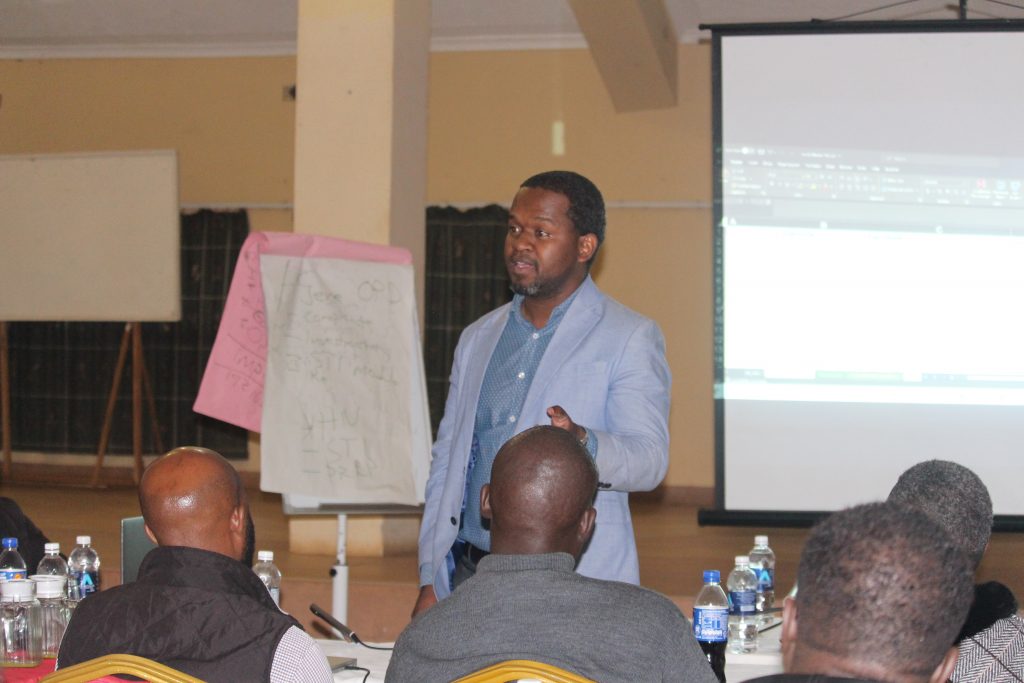
We have a plan to roll out to all the provinces in the next 4 weeks to reach data-driven planning and decision-making from all levels.
Zimbabwe is approaching epidemic control and there is an increasing need for granular monitoring of the evolving epidemic – describing it in time, place, and person to better inform the public health sector response, directing efforts where interventions and resources are needed the most and leaving no person, population group or community behind! This project is funded by PEPFAR through CDC and implemented in collaboration with MoHCC and other stakeholders.
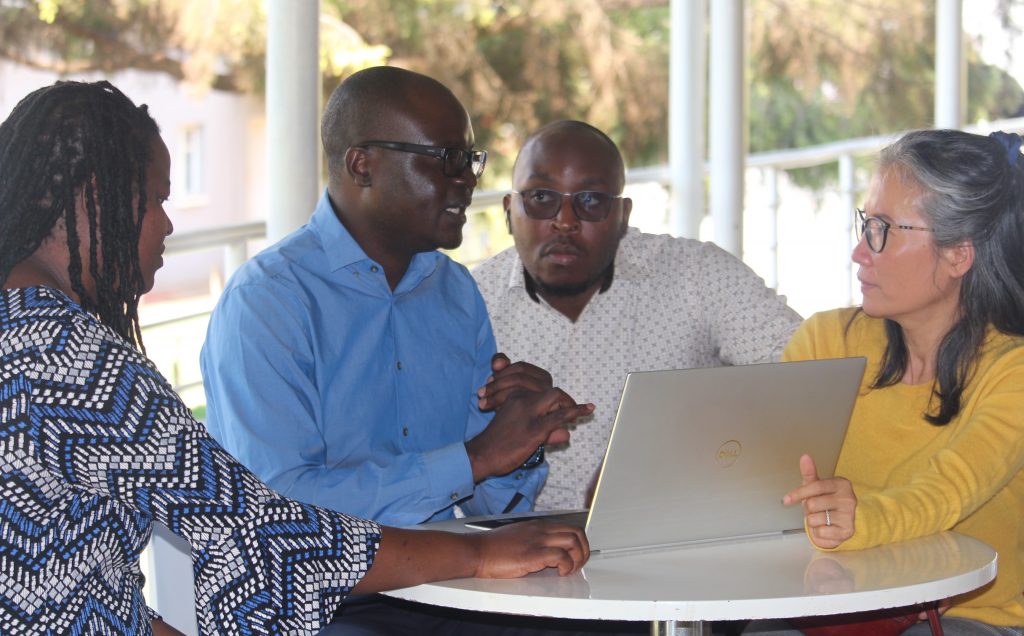
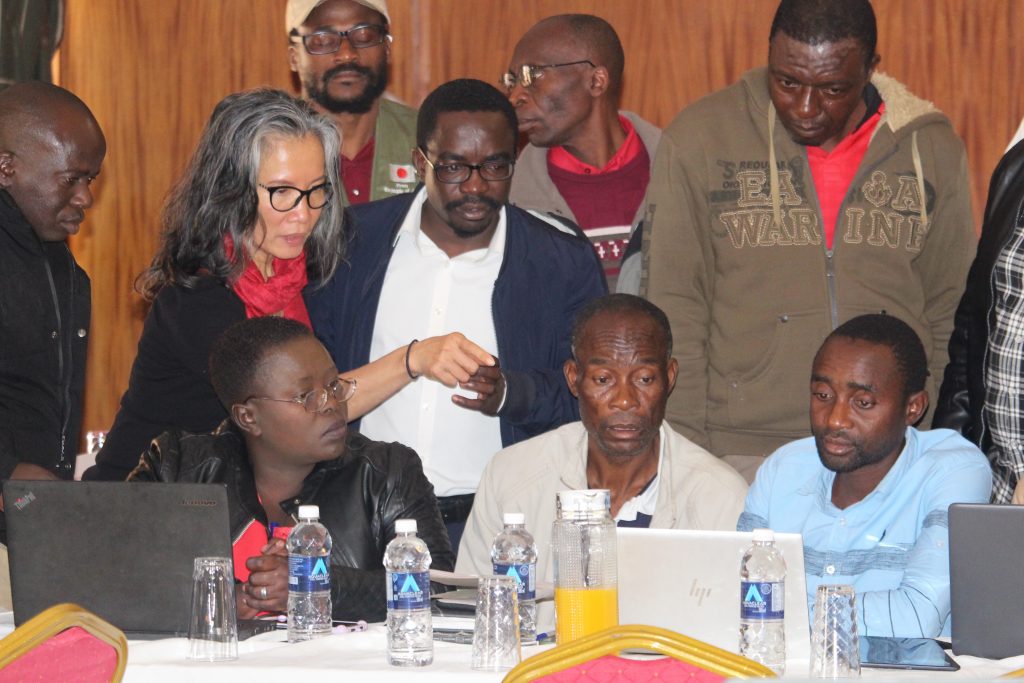

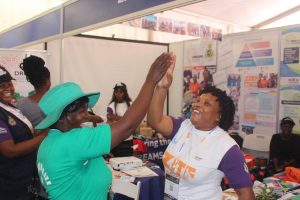
ZimPAAC took part in the 2023 63rd edition of the Zimbabwe International Trade Fare which was launched pre-Independence and adopted the current name in 1980. The ZimPAAC consortium was fully represented by officers and community cadres from three organizations namely Zim-TTECH, PZAT, and Bantwana Zimbabwe. More than 100 dignitaries visited the stand and more than 300 visitors including beneficiaries of the project. People visited the ZimPAAC stand, of interest was the economic strengthening table which had home-made materials from the beneficiaries and live testimonies done by the beneficiaries of the project on the stand.
The consortium was showcasing the DREAMS primary and secondary packages. Community cadres. Community cadres were well-versed in the program’s thematic areas and explained the objectives of the program and shared success stories. Officers were supporting the team with an in-depth explanation of all the packages and protocols for the project. Profiles, pictures samples, and tools were used to explain the DREAMS continuum for a better understanding of all the interventions. DREAMS district mentor (Tsholotsho) had an opportunity to explain the entry points in DREAMS, as well as the primary package and No Means No intervention for the 10-14 in-school beneficiaries to U. S Embassy Zimbabwe Charge d’Affaires.
Engaging men as sex partners of AGYW is of importance in the DREAMS program. During the ZITF exhibition men who visited the ZimPAAC stand had an opportunity to appreciate the DREAMS program and the great work being done in Mat-North. Distribution of condoms was done, and the PrEP champion present was able to illustrate how she creates demand for PrEP in communities and strengthens the linkages and uptake of PrEP services as well as how she works with DREAMS Ambassadors to track AGYW who will have defaulted.
The DREAMS Program Nurse played a pivotal role during the ZITF exhibition. 50 HIV self-test kits were distributed. Condom promotion and distribution were done. Demonstration of how menstrual cups are used was done to visitors who showed interest, AGYW who visited the stand were interested in the menstrual cup, 10 menstrual cups were distributed.
Articles placed.
- Meet Sitheni Ncube, our DREAMS district mentor from the Tsholotsho district. She has been mentoring girls for a year. Her dream growing up has always been to work with girls in disadvantaged communities. She has experience in counselling acquired during her nurse aid training and working with an average of 1000 girls since 2021 to date. Her dedication and passion for her work are shown through interaction with visitors and girls at ZITF. She demonstrates the importance of mentoring girls to attain a Determined, Resilient, Empowered AIDS-free, Mentored and Safe girl.
- Through innovations and regular feedback, DREAMS scaled up on mentorship in 2022, by recruiting DREAMS district mentors for each district being supported. Their role is to ensure AGYW understands the DREAMS primary package, creating demand for clinical services and linking AGYW to skills training with the aim of stirring AGYW towards employment and entrepreneurship. DREAMS Mentors are therefore actively involved in safe spaces, collaborating with community-based cadres to ensure the reduction of HIV-related risks. Furthermore, the DREAMS Mentors support AGYW and community-based mentors as well as other officers to venture into educational pathways to realize their full potential and make aspirations come true.
- # ZITF 2023: Pre-exposure prophylaxis or “PrEP” is the use of an antiretroviral medication by HIV-negative people to reduce the risk of HIV acquisition. People at substantial risk of HIV infection should be offered PrEP as an additional prevention choice. Oral PrEP is highly effective at preventing HIV when used as directed.
- PrEP champions among other community health cadres are strengthening the linkage and uptake of PrEP services and tracking among AGYW in their catchment areas. Mobilise AGYW for HIV combination prevention interventions through social interaction and snowballing. Meet Lubelihle Mkandla PrEP Champion from Nkayi in Mat North
- #ZITF 2023. DREAMS is an HIV prevention program that aims to contribute to the reduction of HIV incidences amongst AGYW utilizing a multi-sectoral approach. Clinical service provision is a critical element of the DREAMS core package as it empowers AGYW to reduce biomedical-related risks. Meet Nothando, a youth-friendly DREAMS Clinical Nurse who provides Clinical services in Tsholotsho, she has been actively providing services at the ZITF to AGYW and males in efforts to normalize access to Clinical services within communities. Thumbs up to the ZimPAAC 20 nurses who provide person-centred clinical services.
With funding from PEPFAR through CDC, Zim-TTECH managed to attend the recently ended OpenHIE conference in Lilongwe Malawi. The conference had representation from over 33 countries, most of which had developed and implemented digital health systems with open-source software and standards.
Zimbabwe team was represented by cadres from the Ministry of Health and Child Care, Zim-TTECH EHR Technical Team, VitalWave and EGPAF.
Zim-TTECH participated in the technical workshop and successfully demonstrated the Impilo E-HR, and several delegates visited the showcase. The
One of the key topics which were of great interest to Zim-TTECH at the conference was the Client Registry (CR), which is part of the system that stores information about individuals who are receiving healthcare services. This information includes demographic data such as name, address, date of birth, and contact details and can be used to improve healthcare delivery by providing accurate and up-to-date information about patients.
Patient matching is another key topic that was discussed, which is the process of identifying patients across different healthcare systems using their demographic data. This is a pertinent component required in the Impilo Digital Health Platform for ensuring that patients receive appropriate care and that their medical records are accurate and complete. It was also noted that most African countries are moving towards the adoption of biometrics to improve patient matching. The facility registry is another key component of health information exchange. A facility registry is a database that stores information about healthcare facilities such as hospitals, clinics, and pharmacies. During the conference, experts discussed how facility registries can be used to improve healthcare delivery by providing accurate and up-to-date information about healthcare facilities.
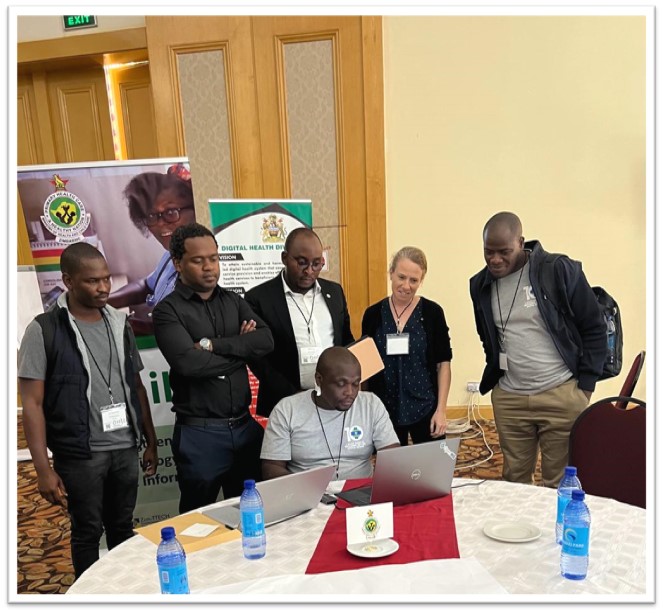
What an eventful November we had, Catch all the updates by reading our newsletter,
We are so excited to be sharing the first ever monthly newsletter with you. Get a glimpse of what we have been upto the month of October 2022.
It is almost midday in Tshiyakwakhiwe village, Dlamini in Tsholotsho, the scorching sun’s intense rays’ heat glares down my neck and I quickly break out into more than a little sweat. Loud squeaky voices and cows bellow can be heard from a distance approaching the Gombalume safe space. Tall trees give plenty of shade under the blazing sun and we all rush to take shade while a group of young girls approach us and take shade under the trees next to us.
Among the group of Adolescent girls and young women that arrive one girl with a baby on her back stood out as she confidently greets us and introduces herself. Her name is Lucia Ncube and she is 19years from Tshiyakwakhiwe village ward 2 of Tsholotsho district. Her confidence stuns all of us and we wonder how such a young innocent girl has a 4 month old baby,
“I innocently fell in love with my boyfriend and because of young and immature love we quickly started engaging in sexual activities. He assured me that I was not going to get pregnant if we indulge for the first time and he promised he was not going to impregnate me. I naively believed him and I gave in. A month later, a bomb dropped on me, I was pregnant,” narrated a bright-faced Lucia, you would expect her to sadly share her story but that was not the case with her.
Born and bred in Tsholotsho, one of the most conserved communities in Zimbabwe, Lucia had little to no information on her Sexual Reproductive Health Rights and this was a taboo conversation to be discussed in a family setup,
“Growing up, we never discussed issues to do with practicing safe sex , family planning, and sex in general. As a young girl I was discouraged to talk about such issues. I could have practiced safe sex, avoided pregnancy and being a mother at a young age,” she said.
“Use of any family planning methods was unheard of especially for Adolescent Girls and Young Women who would have never had children. Family planning was attached to myths of possible lifetime infertility yet every woman`s dream is to breastfeed at some point in their life,” shared Lucia.
In January 2022, Lucia enrolled in the Zimbabwe Partnership to Accelerate AIDS Control (ZimPAAC), supported DREAMS program that is being implemented in the Matabeleland North province of Zimbabwe in Lupane, Tsholotsho, Bubi and Nkayi districts.
“The DREAMS program has changed my life for the better. It has opened my eyes. If I had had the information I have now earlier my life would have been different. However there is no need to cry over spilled milk, I have decided to make my life better for me and my son,” said Lucia
“ Now I know how to protect myself while practicing safe sex, I know how to avoid unwanted pregnancies, I have access to family planning methods, HIV self-testing and the use of Pre- Exposure Prophylaxis. Through the Health4Life sessions I have learnt that I have rights to protect myself and my body, I have learnt about financial literacy and how important it is for me to save and start my own business. This is something I had never thought of but now I need to build a bright future for my son.”
“We were trained on ISALS and we have started a group with my friends and we intended to assist each other start a business and build a better future for us,” She said.
Lucia is one of the 27 000 AGYW mentored through the DREAMS program to date to enhance knowledge, strengthen social protection of AGYW, and build social assets. The DREAMS program seeks to reduce new HIV infections among the most vulnerable adolescent girls and young women by 40% in the highest HIV burden districts in Zimbabwe. DREAMS implementing partners (Bantwana and Pangaea Zimbabwe AIDS Trust) under the ZImPAAC consortium prioritize AGYW’s health, wellbeing, and HIV epidemic control through the provision of evidence-based curricular and need-based secondary services.
Zimbabwe Technical Assistance, Training and Education Center (Zim-TTECH) is the recipient of a new five-year PEPFAR award- Strengthening Epidemiology and Strategic Information grant through the Center for Disease Control (CDC). The award officially begins on 30th September 2022
The award will be implemented through the “Impilo” Electronic Health Record (EHR)/CBS program. The program aims to build the Ministry of Health and Child Care’s (MOHCC) capacity at the national, provincial, and district levels to collect key strategic information (SI) required to measure progress towards achieving epidemic control and generate a strong evidence base for informed program decision-making in Zimbabwe.
Zim-TTECH envisions universal access to safe, client-centered, and high-quality healthcare for all people while working to improve the health and well-being for all through the provision of technical assistance and direct service to the health sector, as well as strengthening healthcare worker skills to support the sustainability of health systems.
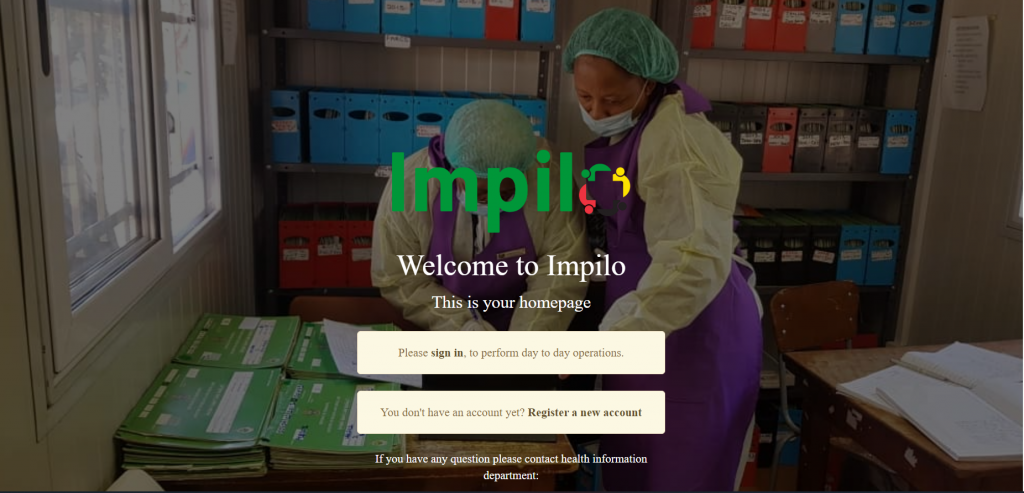
It is mid-afternoon and the bellowing sound of cows is heard in a distance. The scorching sun’s heat is unbearable and makes it very difficult to walk in the sandy soil of Bubi District in Matabeleland North province of Zimbabwe. Clouds of smoke can be seen from a distance signaling the preparation of midday meals. We walk into Thompson Maseko’s homestead in Vadala village. We go to the neatly thatched kitchen and announce our arrival.
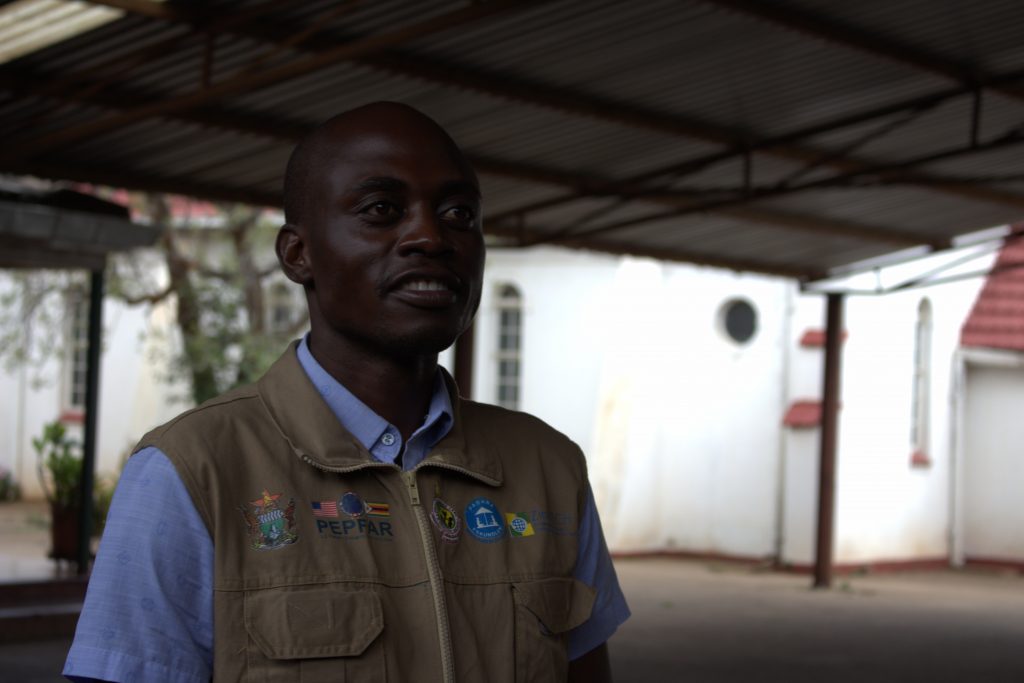
A lean, tall guy walks out followed by two little girls, the resemblance is out of this world, he certainly and without doubt, is the father. Maseko introduces himself to us and lets us know that he is the Padare Enkhundleni Men’s Forum on Gender Male Advocate in Vadala Village. We are excited because he is the one we have come to see.
Padare Enkhundlen Men’s forum on Gender is a movement of men advocating for gender justice in Zimbabwe and is one of the partners under the Zimbabwe Partnership to Accelerate AIDS Control (ZimPAAC) consortium.
The spicy aroma from the kitchen does not escape our nostrils and we hope to see his wife busy in the kitchen only to find out that he was the one doing the cooking for his young girls,
“My wife has gone to work and I am home with my daughters so I was preparing lunch for them,” he said. The look on his face does not show that he is doing something out of the ordinary, for him cooking for his daughters is as normal as any other house chore.
“As a male advocate in my community, I encourage men to challenge masculinity, there is nothing wrong with sharing house chores and helping around the house,” he sternly said.
While we are still doing the interview, Maseko excuses himself to go and serve his daughters food and we are glad to watch him do so. In 2020, He was crowned the best Male Advocate in Matabeleland North where he works with Zim-TTECH and Padare Enkundleni Men’s forum encouraging men to get circumcised and demystify myths around Patriarchy.
“I mainly do one on one interactions with men in my community and I work with my village traditional leadership to encourage men to get circumcised. So far, I have reached over 600 individuals in and around my community. In just a month I meet with around 60 men with whom I have conversations around male circumcision and HIV testing,”
“Now, I have frequent visitors who come to enquire and get insights, some of them I refer to the local clinic for further assistance. We have HIV self-test kits that we encourage people to use regularly,” highlighted Maseko.
“I have seen significant changes in my community since I started as a Male Advocate. I have seen men accompanying their wives to access health services. I have seen men help out with house chores. A lot of men in my community are now seeking health services. They no longer shun visiting health facilities and that is a good sign.” He said.
Male Advocates in Matabeleland North work with the Ministry of Health and Child Care through the Zimbabwe Partnership to Accelerate AIDS Control (ZimPAAC) consortium. Padare in Matebeleland North addresses social norms that promote patriarchal domination and all forms of abuse by men that leads to poor health-seeking behavior and gender-based violations. Male advocates work with other critical stakeholders such as National Aids Council and gender organizations to ensure a coordinated approach as well as ease of referrals. Padare engages men in the communities through safe space dialogues where men challenge harmful and toxic masculinities in an endeavour to create a gender-just society. Apart from mobilizing men for services such as Voluntary Medical Male Circumcision, sexually transmitted infections, and HIV testing services, Padare also supports health facilities with Anti-Retroviral Therapy defaulter tracking. This includes bringing back to care males that would have defaulted or deferred on ART due to different circumstances.
Through dialogues in COP20, male advocates have reached out to 95,729 men and boys since 2020 to date. These are men and boys that participated in the dialogues that were held in communities on social norms. Male advocates reached out to and referred for HTS services 36,596 men and boys. Under Voluntary Medical Male Circumcision (VMMC) a total of 2,0707 have been referred for VMMC. A total of 7722 males have been referred for STI screening and a total of 2900 male defaulters have been followed by male advocates while a total of 3,946 males were challenged to accompany their intimate partners for ANC visits.
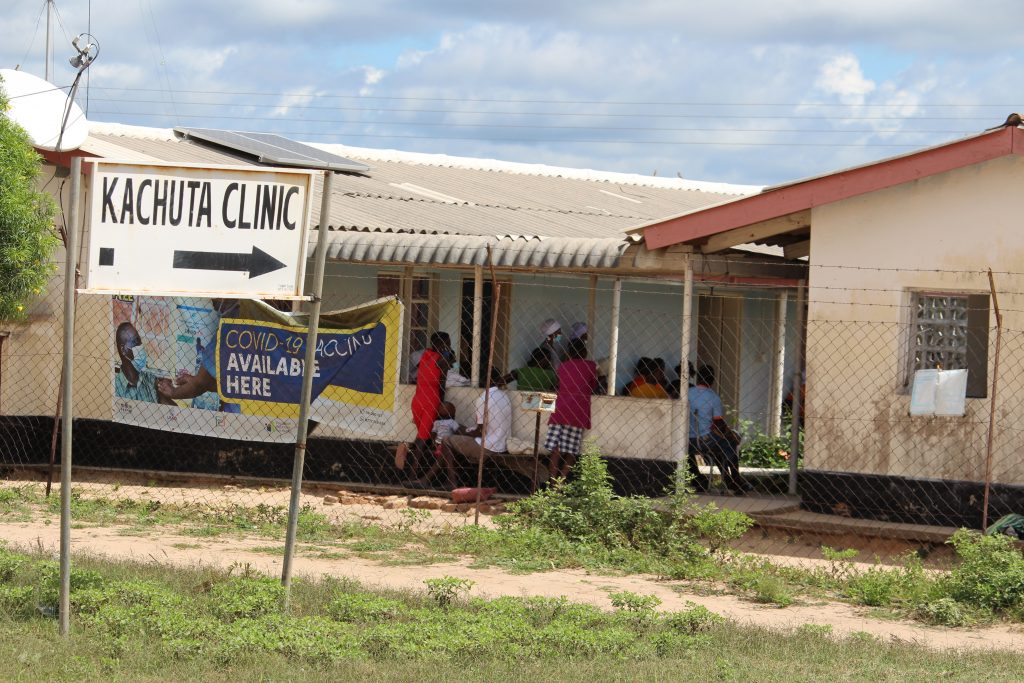
Located approximately 155 kilometres away from the Capital city, Harare, lies Guruve, one of the eight districts in the Mashonaland Central province of Zimbabwe. The district capital is the town of Guruve and around 25 kilometres away is Kachute Clinic where Zim-TTECH offers Technical assistance supporting the Ministry of Health and Child Care.
In a bid to improve viral load coverage, Zim-TTECH supports Quality Improvement initiatives to its DSD and TA sites. The Quality improvement team focuses on processes and systems, use of data to improve services, and use teams to ensure quality.
Kachuta Clinic has proved to be one facility that is doing well since the roll out of Clinic Lab Interface QI initiative, as the team has proved to be a force to reckon, with a well-documented QI corner in place with the run charts well plotted up to date with annotations.
“We have monthly team meetings, where we update each other on any issues arising during the course of that month, we set our targets and we do not work in silos. If one of us is not available then anyone among the team members can assist,” said Sister Zvidzayi Munyaradzi, the OI focal person.
These monthly meetings link and allow flow of information within the facility from the Testing area, OI desk and the Laboratory Department as well as allocation of roles and responsibilities.
It is during these meetings that the team, comprising the Nurse in charge, Primary Counsellor, OI Focal person, Primary care nurse and the Microscopist share information, responsibilities, check achievements, go over registers and note areas of collaboration. The NIC appoints one of the nurses to be the focal person of the OI/ART clinic.
Mr Mupezeni, the Microscopist highlighted how the rollout of CLI QI has assisted the facility as they are now able to book the clients in the appointment diary using code3, documentation of the Facility viral load register and transmittal register, identify clients who are due for Viral load sample collection as well use of the Vacutainer system on plasma collection,
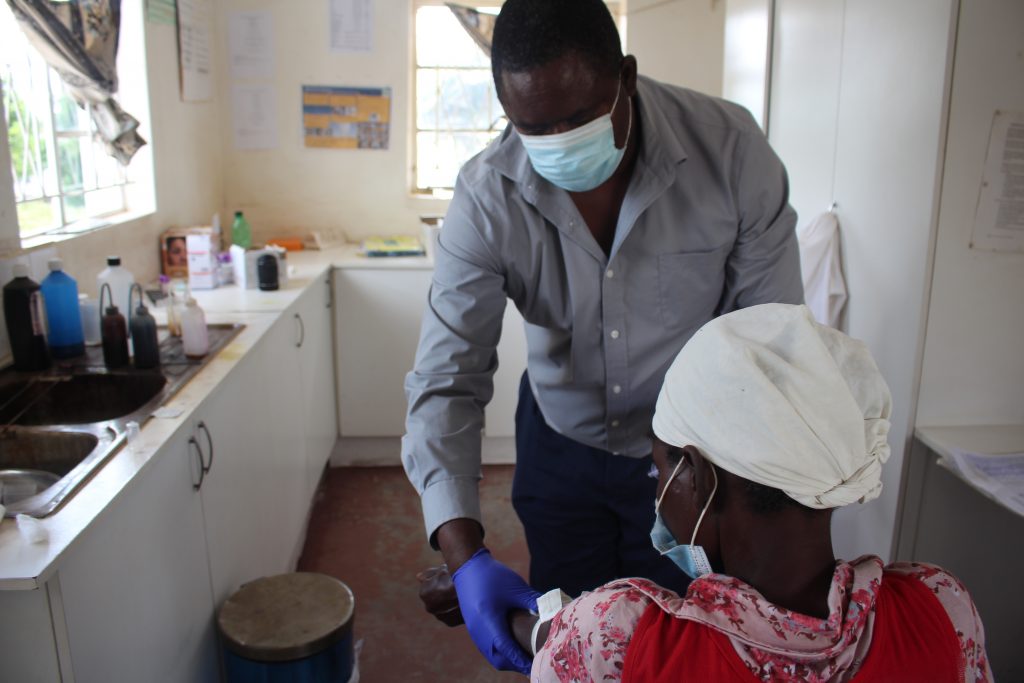
“It used to be difficult to track clients due for Viral load, but ever since we rolled out QI and adopted the cohort system it is now easy. We are now able to identify challenges and problems quickly as a team. As I chat to you right now, I can confidently say I can use the Vacutainer system for plasma collection after demonstration during CLI roll out,” said Mupezeni.
“We have clear follow up procedures, and we refer to our registers for any information needed. This is because our documentation in the registers has improved due to QI mentoring and support from the coaches,” he said.
“Drug pick up has also improved, if a client does not show up, we do follow up as this is easy to track in our registers. We have a clear appointment system in place which is very effective and a follow up of missing results tool is in place. For instance, when we send Viral load samples to the District hospital sometimes not all results are sent back to us, so we have a tool that we designed with client details that we will use to follow up on the missing results,” He said.
The Kachute team has proved to be effective as they do not work individually but as a team. This can be evident by the amount of time they have clients at the facility, they work swiftly together as a team and every team member is aware of what needs to be done and how. With walls amassed with charts and graphs, the clinic uses facility-level data to monitor the progress of the QI project using the plotted graphs.
“We do not encourage specialisation at this facility because what happens when the person specialising in a certain area is not around. We do not want to short-change our clients hence we encourage each team member to be and all-rounder,” said Sister Munyaradzi.